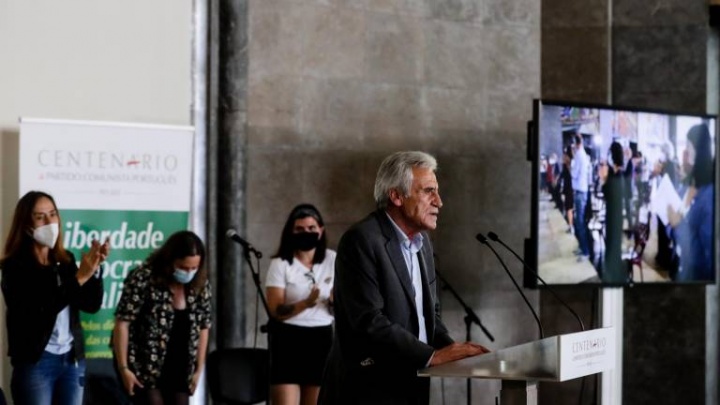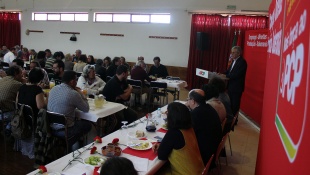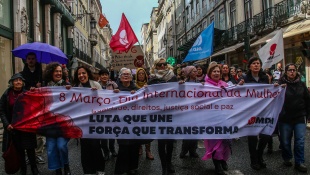As Marx stated, with recognised accuracy, the degree of female emancipation is the natural measure of the degree of the universal emancipation. The remarkable advances in the condition and rights of women in the 20th century, in Portugal and in the world, are closely linked to political, social and civilisational development, an integral part of their struggle and the struggle of workers and peoples for the progressive transformation of society, and are in the wake of the many achievements made by this broader struggle.
Conversely, the worsening of exploitation, inequalities, discrimination and violence that characterise the situation in different countries gives us the dimension of the profound setbacks in the situation and rights of women, and the profound evils that affect the workers and peoples of these countries.
Women's emancipatory struggle continues to be a central aspect against all attempts and effective setbacks in their situation and rights.
Setbacks that are inseparable from the offensive of the capitalist system and the policies that serve it, based on the intensification of exploitation, precariousness, low wages, privatisation of public services and the transfer of important resources to large economic and financial capital.
This struggle is part of the struggle against the serious problems of humanity such as hunger, poverty, malnutrition, slave labour, the commercialisation of a woman's body in prostitution, trafficked or not trafficked, or surrogate motherhood and the transformation of children into a marketable asset that fuels the business of breeding companies.
The so-called “gender equality” policies are promoted by the system for its service, not responding to problems and discrimination to which, despite everything, they give centrality. Problems and discrimination that the system permanently replicates through the guidelines issued by its authorities, of which the European Union is an example, whose solutions have no social impact in responding to the problems of women at work, in the family and in society, but rather are an instrument to serve the fundamental options of its labour, social and budgetary policies, among others.
What they intend is to erase the ideologies that are in rupture with their vision of the world and their domination in society. Create the illusion that the organised struggle of women is expendable. Concealing in the media space those who confront the real causes and those politically responsible for discrimination and violence against women, stigmatising the organisations that promote them, whose leaders are often the target of persecution, intimidation and repression. To, on the other hand, promote and forge "new players" who have the task of absolving and evading the political responsibilities of governments and European and world bodies, through the instrumentalization of women's struggle, aiming to lead them to "dead-ends” because their claims are on the side-lines of those that may correspond to a path towards their resolution.
For the PCP, the emancipation of women means, on the one hand, the emancipation of working women from capitalist oppression and, on the other, the liberation of women, in general, from inequalities, discriminations and injustices.
These are both present and future goals. Anchored in the organised struggle of women for their own rights and its convergence with the broader struggle of workers and peoples of which they are an integral part.
Looking back over the last 100 years, there is an umbilical cord that binds the history of the PCP's action and struggle to the history of women's struggle knowing how to understand and always being at the forefront in supporting their aspirations and rights and assuming them as its own. , because the rights of women, and their emancipation within the framework of socialism, is a project and a cause for the present and the future.
The role of the PCP over these years is inseparable from the contribution of successive generations of communist women at different levels of party activity, but also in women's organisations, trade unions and other important social organisations as already stressed.
Allow me a word to highlight the contribution of Álvaro Cunhal, in this struggle for the emancipation of women. From the outset and very early on with his thesis "Abortion, causes and solutions" defended in 1940, and later as leader of the Party, his theoretical and practical contribution to the Party's action, as exemplified in the Conference «The Emancipation of Women in the Portugal of April» which now makes perfect sense to recall: «As the conference attests, our Party is deeply committed to the defence of the rights of women and in the struggle for their emancipation. Women's action is, however, a fundamental feature of the process. We say to the women, and first of all to the working women, that they have a firm and permanent defender of their interests, rights, aspirations and goals in the PCP. But, at the same time, we make a call: Woman! Take the conquest of your rights into your own hands! That is: organise yourself, actively participate in trade unions and other unitary organisations, put forward your claims and objectives, fight for them, mobilise the female masses for the struggle.
We assign to the communist women a special responsibility in conducting the general action and intervention in the Party and in particular and with great importance also in their connection to women, their specific problems, their struggle, paying attention to learning their problems and aspirations, to their change in thinking and acting, and in instilling confidence in the irreplaceable value of their organised struggle, whether for the satisfaction of the claims that are common to the workers and people, of which they are an integral part, or in the demand for the eradication of inequalities, discrimination and violence that affect them at work, in the family, in social, political and cultural life.
In the PCP, the rights of women and their emancipation are the responsibility of all militants – women and men – at various levels of party life, in institutional work, in the Assembly of the Republic, in Local Government or in the European Parliament. Because this is inherent to the nature and project of this Party. As such, our vanguard role in the emancipatory struggle of women is not a proclamation of political rhetoric, nor fed by the heritage of action and struggle received by generations of communist women and men. It is a practical exercise that we have to make at all levels, correcting shortcomings, valuing what some insist on erasing or distorting, intervening on the reality for its transformation, dialoguing and cooperating with all those who defend women's rights, in law and in life.
The PCP intervenes in the current framework for the implementation of equality in work and life, demands a break with the right-wing policy of the last few decades that fosters a "make believe" equality, embodying a political alternative that enforces women's rights inserted in the patriotic and left-wing policies that we advocate. In other words, guaranteeing work with rights, ending job precariousness, valorising professional progression and careers; to enforce pay equality between men and women, inseparable from raising the wages of all workers; reduce working hours to 35 hours a week, put an end to the deregulation of working hours; enforce maternity and paternity rights; restoring the statutory retirement age to 65 and guaranteeing the right to retirement and a decent pension, as well as the right to retirement without penalisation with 40 or more years of social security payments; invest in public services and in the social functions of the State, safeguarding the rights of its workers – mostly women – and guaranteeing equal access for all women to healthcare, social security, justice, education, among others.
It is also necessary to go much further in preventing, signalling and protecting against domestic violence. Expanding and giving effectiveness to an intervention of detection, signalling and protection of women who live in environments of domestic violence, with a decentralised and articulated structure, with the reinforcement of the necessary means for public services and others that have to intervene in this field.
It is essential to prevent and combat the exploitation of women in prostitution, creating economic and social conditions so that the poorest and most desperate women do not have to resort to it, but also by creating programmes for those who decide to abandon it.
In the new policy we advocate, we focus on strengthening the social and political participation of women at various levels, as well as changing the mentality and behaviour of women and men in overcoming prejudices and stereotypes, and promoting information on the rights of women, promoting the raising of their social and political awareness that equality in work and life is a condition for the progress and democratisation of the country.
We acknowledge the importance of a change in mentalities for the emancipatory struggle of women. In fact, this fight embodies the confrontation of ancestral conceptions, but it also undermines the economic, social and cultural foundations that are at the root of this reality that discriminates against women.
Life in these 100 years has proved that the PCP is necessary, indispensable and irreplaceable for the workers, for the people and for the Country, just as in the struggle for the emancipation of women!
With the experience and value of its past and its vigorous present action, we will know how to build a future lived in equality!




